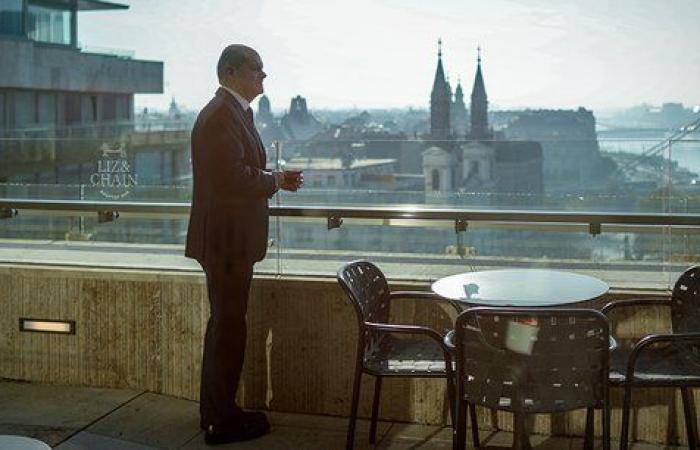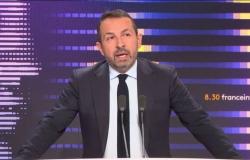Engaging in conversation with Vladimir Putin rarely works to your advantage. At the start of the war in Ukraine, Emmanuel Macron learned this the hard way. Since then, almost the majority of Western leaders have broken all contact with the Kremlin. Until, on Friday, Olaf Scholz broke this sanitary cordon and decided to call Vladimir Putin. If Volodymyr Zelensky had been warned of this phone call, he is no less furious. The Ukrainian head of state estimated that Berlin had opened a “Pandora’s box” by taking the Russian out of his isolation.
According to the German Chancellery, the exchange between the two men lasted sixty minutes. Of course, officially, each party remained in its own lane. Scholz rolled out the argument of kyiv’s allies by demanding the withdrawal of Russian soldiers from Ukraine and asserting that Western support for kyiv would continue as long as necessary.
Political crisis in Germany: the budget should not be adopted immediately
Putin, for his part, once again held NATO responsible for the situation and warned that future negotiations must take into account the “new territorial realities”. In other words, that Russia was not ready to give up the regions conquered in a thousand days of conflict.
Rout announced
The Kremlin, which also communicated about this exchange, took the opportunity to slip a few banana peels under Scholz’s feet. First by specifying that it was indeed the German who had initiated this conversation. Then by explaining that the energy question, therefore the supply of Russian gas to Germany, had been addressed. Enough, perhaps, to sow doubt on the chancellor’s true intentions.
Yesterday, the conservative opposition CDU jumped at the opportunity to accuse Scholz of serving Putin’s propaganda. Could the social democratic leader have sinned through naivety? Probably not if we consider that this call is above all guided by the political crisis playing out across the Rhine. After the breakup of his coalition last week, Scholz had to resolve to organize new early legislative elections, which will take place on February 23.
However, his party, the SPD, is languishing in the depths of the polls, far behind the CDU. To prevent this predicted rout, Scholz must therefore attempt blows. With this appeal to Putin, he can hope to speak to voters about movements that are not very hostile to Moscow, notably those of the rising star of the far left, the very Putinophile Sahra Wagenknecht.
More generally, while Germany is going through an economic crisis, support for Ukraine – Berlin is the biggest contributor after the United States – is going down increasingly poorly in the country. “Germany has only one obsession at the moment: saving its industrial power, says Nicolas Tenzer, teacher at Sciences-Po and confident lawyer for Ukraine. That comes before anything else. »
Political crisis in Germany: the budget should not be adopted immediately
For several months, the chancellor has been making his little music heard in Europe on the Ukrainian question. “Along with the United States, he is the one who most strongly opposes the integration of Ukraine into NATO,” continues Nicolas Tenzer. Scholz is equally reluctant to see kyiv use long-range Western weapons to strike Russia in depth and therefore still refuses to deliver Taurus missiles.
A month ago, he decided the time had come “to do everything – in addition to clearly supporting Ukraine – to find a way to prevent this war from continuing.” This conciliatory tone also responds to the traditional Eastern policy of a part of the SPD, which seems to have been brought up to date. “Some members of his entourage, such as his security advisor, Jens Plötner [qui a assisté à la conversation avec Poutine]have always been on a fairly ambiguous, even benevolent, line towards Moscow,” judge Nicolas Tenzer.
Another sign that the SPD is still eyeing the East: at the end of October, the new secretary general of the party, Matthias Miersch, announced the reinstatement of Gerhard Schröder, while the former chancellor, now senior manager of the gas giant Russian Gazprom, took up the cause of Vladimir Putin.
Frontage unit of Vingt-Sept
Of course, Friday’s call is also part of a new international landscape since the election of Donald Trump. The Republican has promised a rapid end to the conflict in Ukraine, and Europeans fear that he will bypass them by entering into direct negotiations with Putin. This is particularly what the German would have said to the Russian president.
In the meantime, the Twenty-Seven seemed to agree to display unity and show that they were ready to still support kyiv even if the United States had to disengage. “This phone call from Scholz breaks this common front, says Nicolas Tenzer. This is an absolutely disastrous signal. » If Berlin assured that this initiative had been coordinated with France, the United States and London, the Élysée explained that the messages delivered during the call had not been coordinated beforehand.
Tomorrow, on the first day of the G20 in Brazil, Scholz should therefore not cut short a debriefing with his partners. But the summit could also be an opportunity to continue discussions with Moscow, since a Russian delegation, led by Foreign Minister Sergei Lavrov, is expected in Rio. Scholz also announced that he would speak with Chinese President Xi Jinping who, for months, has been trying to position himself as a mediator between kyiv and Moscow.






